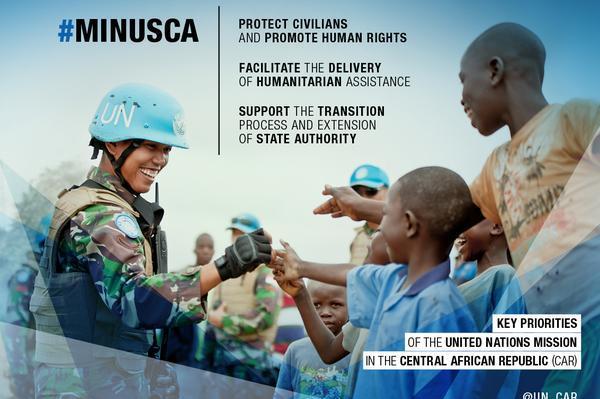By Crispin Dembassa-Kette
The United Nations on Monday took over a peacekeeping mission in the Central African Republic previously run by the African Union, a move that rights groups said must lead to more action to protect civilians from attack.
The former French colony has been paralysed by violence for nearly two years and is now deeply divided, with its north mostly occupied by mainly Muslim Seleka rebels who seized power nationally last year but were forced to step down in January.
Members of a 6,000-strong African Union peacekeeping force, which has struggled alongside some 2,000 French troops to restore order, on Monday swapped their green AU berets for the blue ones worn by U.N. peacekeepers across the world.
The existing African troops are being joined by soldiers from elsewhere, including Morocco, Bangladesh and Pakistan.
In Bangui for the ceremony, Herve Ladsous, the head of U.N. peacekeeping, said U.N. forces would take firm steps to protect civilians, build zones of confidence and support the country’s government.
U.N. command will see the mission increase numbers to about 12,000 and should secure better financing and air support for peacekeepers.
While levels of violence have eased in parts of the country, especially in the capital, rights groups said sectarian violence had risen in the centre and the east in recent months.
“Civilians are being killed by all sides at an alarming rate and people are desperate for protection,” said Lewis Mudge, Africa researcher at Human Rights Watch.
“There is no time to lose. The new U.N. mission urgently needs to get more troops into eastern and central areas and take bold steps to protect civilians from these brutal attacks.”
The violence has killed thousands and forced around 1 million — about a quarter of the population — to flee their homes.
“Today’s deployment is important,” said Anne-Marie Brinkman, country director of the International Rescue Committee, an aid organisation.
“However it is crucial that the international community honour their commitment to CAR and scale up to the full complement as soon as possible.”
The deputy head of the interim parliament said last week elections set for February would probably be delayed because of persisting insecurity.
The country is rich in gold and diamonds but has seen little but conflict and political instability since independence from France in 1960.
With neighbours like Sudan, the Democratic Republic of Congo and Chad, its conflicts have often been allowed to fester.
“Today’s events mark a clear shift – a new stage in the stabilisation of the country after the cycles of barbaric and aimless violence of the last three decades,” said interim President Catherine Samba-Panza.
(Additional reporting and writing by David Lewis; editing by Andrew Roche)



